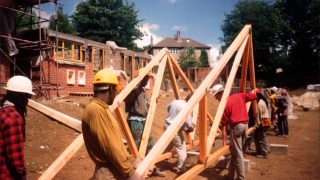
Image of Frontline Self-builders on site by Claude Hendrickson
New research has been published that looks at the evolution of community-led housing in Leeds from the 1970s. It gives a broader context to some of the more notable recent community-led housing examples like LILAC and ChaCo, and evidences the rich diversity of the different community-led housing projects that have existed over time.
The research reports that:
- Peaks in local community-led housing activity relate to periods of national government support and funding. Local and regional networks of knowledge, land ownership, and sources of funding are needed to break out of this cycle.
- The community-led housing movement can be strengthened when you look at local histories over time, and recognise the contribution that all projects play in building expertise and providing role models for different communities and ways of living.
- It is because of the various local projects that Leeds Community Homes was able to form in 2015, providing a front-running regional enabling hub in England.
- The form of community-led housing has shifted from a more intense model of communality in a shared house, to larger scale developments with individual houses and shared collective spaces. Varying levels of community participation are also evident over time. Recognising this can broaden what community-led housing is, and support greater choice to suit different needs and desires.
- Long term and targeted funding is required to build knowledge, skills, and support formation of organisations so that community-led housing can come from, and be led by, disadvantaged groups.
- New-build community-led housing is a very slow and complex process, and we need to complement these projects with the creation of community-led housing from the existing privately owned housing stock.
The research calls on people, civil society networks, and local and combined authorities to recognise and celebrate the particular strength of community-led housing in Leeds and build on it as a rare source of hope and inspiration against various societal crises.
The research was produced by Neil McKenna (University of Leeds), Professor Paul Chatterton (University of Leeds) and Dr Andrew Wallace (University of Greenwich).
Link to research (open access): https://www.tandfonline.com/doi/full/10.1080/13604813.2024.2430059





